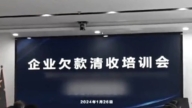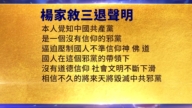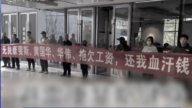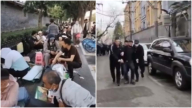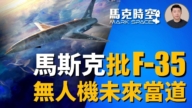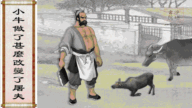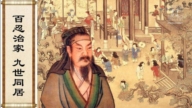【新唐人2011年11月26日讯】最近,中共各省领导层正在进行密集调整。中共喉舌央视台台长也列入了调整的行列。原《光明日报》总编辑胡占凡被任命为中央电视台台长,免去了原台长焦利的职务。当局没有说明人事变动的原因,焦利的去向也没有公布,一时间引发各种猜测。
中共《新华网》11月24号报导,中共中央决定,任命胡占凡为中央电视台台长,免去原台长焦利职务,另有任用。
报导除了介绍双方的简历之外,没有提到任何焦利被免职的原因,也没有安排焦利的新职位。
记者致电《光明日报》社,接听电话的工作人员表示,还没有接到有关通知。中央电视台台办则确认了焦利被免职的消息,但表示,不方便透露具体情况,要采访需要发函申请。
台湾《中国时报》驻京记者王铭义认为,从目前情况来看,当局没有具体表态,对焦利是升还是降,还不好下结论。
1953年11月出生的胡占凡,毕业于北京广播学院新闻系新闻学专业研究生班。2001年10月,当选中华全国新闻工作者协会第六届理事会副主席。2010年3月30号调任光明日报社担任总编辑。
焦利,1955年出生,辽宁大学经济系毕业。1997年任辽宁省委宣传部副部长。2008年任中共中央宣传部副部长。2009年5月担任中央电视台台长。
曾经在新西兰接待过焦利的新西兰国会记者团协会会员,记者王宁向记者表示,焦利非常适合在官场,他善于揣摩上级的意图,也乐意与下级沟通。
新西兰国会记者团协会会员王宁:“李长春原来是辽宁省委书记,他是李长春常委里面的,他们经常在一起,属于共事的关系,李长春属于班长他是班副这样的情况 ,他是负责宣传这一口的,作为政治来讲是最重要的。他是为李长春,整个辽宁省委共产党委员会服务的。”
不过,已经68岁的政治局常委,统管中共宣传思想、意识形态的李长春,18大后将要下台已经是定局。而李长春在任期间,中国的新闻自由度、言论自由每况愈下,并越来越紧缩。
原《新华社》记者高瑜观察,18大前中共中央媒体人员都在紧密的互相调动。
原《新华社》记者高瑜:“六中全会就提出来,所谓要打改革旗号。实际上就是加紧党对媒体和舆论的控制,对各个媒体都要加强控制,就是最后了吧,它这是维稳的措施,希望不要出事。”
高瑜还指出,中共主要媒体一把手都是由中组部直接任免,并不是民选的。
《中国时报》引述北京一位资深媒体人的话说,当局把胡占凡调到央视,可能是要收紧新闻尺度。
原《新华社》记者高瑜:“这个是肯定的,他就是不去那边,也得收紧。因为中央电视台是影响最大的,你不管人民日报还是新华社它发的东西,有的是对外的,还有点影响,像人民日报没有人看啊,你就是废纸一堆啊,但是看电视嘛,大家都要娱乐嘛,现在就是看电视影响比较大,所以它是天天都要下条文的。”
高瑜表示,当局任免领导干部会选择最符合中共干部标准的,宣传主旋律最有能力的。
胡占凡在任职《光明日报》总编辑期间,《光明日报》曾发表过《两种不同性质的民主不可混淆》、《划清“四个重大界限”:思想政治工作的重要着力点》等抨击政改的文章。
《两种不同性质的民主不可混淆》发表在中共总理温家宝深圳呼吁政治体制改革之后。文章声称,如果有人在没有认清“谁来统治”之前就去讨论具体政治(改革)问题的是非,必定是盲人摸象,错漏百出。
新唐人记者常春、李静、孙宁采访报导。
CCP Appoints New CCTV President
Recently, personnel adjustments are being made intensively
among the provincial leadership of Chinese Communist Party (CCP) authorities.
President of China Central Television (CCTV), CCP’s
mouthpiece, was ranked in the list of adjustments.
Former Guangming Daily editor-in-chief, Hu Zhanfan,
was appointed as the new CCTV president, replacing Jiao Li.
The CCP authorities have not given any reason for the changes
nor declared what has been arranged for Jiao Li.
The action has aroused conjecture and guessing.
On November 24, CCP official media Xinhua.org
reported that the CCP Central Committee had
approved the naming of Hu Zhanfan as the
new CCTV president, replacing Jiao Li.
The Xinhua report published the resumes of two people, but
without mentioning the reason for Jiao Li’s dismissal, nor stating Jiao’s new appointment.
Staff at the Guangming Daily, one the CCP’s official
newspapers told the media that
they had not yet received any related notification from
the authorities.
CCTV’s general office confirmed the news to the media,
but said it would not be convenient to disclose specific details,
and a written application was required for approval
before any interview.
Wang Mingyi, a reporter of Taiwan’s China Times,
based in Beijing said that judging from the current situation,
the CCP authorities had made no specific statement
on Jiao Li’s new appointment, so would not be appropriate to jump to conclusions at the moment.
Hu Zhanfan, born in November,1953, graduated from
the Beijing Broadcasting Institute, majoring in journalism.
Hu was elected as vice-chairman of the Sixth Council of
All-China Journalists Association in October, 2001.
On March 30, 2010, Hu Zhanfan was appointed as
Guangming Daily’s editor-in-chief.
Jiao Li, born in 1955, graduated from Liaoning University,
majoring in Economics.
In 1997, Jiao was appointed as Deputy Minister of the
Propaganda Department of CCP Liaoning Provincial Committee.
In 2008, Jiao assumed the position of Deputy Minister of
Propaganda Department of CCP Central Committee.
Jiao was later named as CCTV president in May, 2009.
Wang Ning, Congressional Correspondent for New Zealand,
who received Jiao Li in New Zealand, told NTDTV that Jiao was well adapted to officialdom.
He was good at figuring out his superior’s intentions,
and also willing to communicate with his subordinates.
Wang Ning : " Li Changchun was the former CCP Secretary
of Liaoning. Jiao Li was the standing committee member of CCP Liaoning Provincial Committee.
They were colleagues. Li Changchun was the head, and
Jiao Li was in charge of propaganda, which was the most important role in terms of CCP politics.
That is, Jiao Li worked for Li Changchun and for the entire
Liaoning Provincial CCP Committee. “
However, 68-year-old Li Changchun, Politburo Standing
Committee member of CCP Central Committee,
was the head of CCP propaganda and ideological section.
Li looks certain to step down after the CCP’s 18th congress.
During Li Changchun’s office tenure, China’s press freedom
and freedom of speech were going downhill, and were getting more tightly controlled
According to the observation of Gao Yu, a former reporter
of Xinhua News Agency, personnel adjustments among
the CCP central medias will be intensively made until
the CCP’s 18th congress opens.
Gao Yu: “CCP’s Sixth Plenary Session proposed to
wave the flag on reform.
It was actually to step up the CCP’s control over media
and public opinion, over all media outlets .
This is the measure taken in the final phase,
to maintain stability, in order to avoid social unrest.”
Gao Yu points out that the appointment and removal
of the CCP’s major media heads are made by
the Organization Department of the CCP’s Central Committee, and
not elected by civilians.
The China Times’ article quoted a Beijing-based
veteran media professional as saying that
Hu Zhanfan’s appointment as CCTV president might be a
signal of the CCP’s tightening up on the depth of reporting.
Gao Yu: “They’ll definitely do this. Even if Hu were not
appointed, news reporting would be tightened.
Because TV has the greatest impact, some CCP media such
as the ‘China Daily’ is specially designed for overseas, it might have a little bit influence abroad.
However, in China nobody is interested
in reading their ‘People’s daily.’
So there are just piles of wasted news papers.
But we all need to watch TV for entertainment
That is, the TV can produce a greater effect on people’s minds.
So now every day the CCP authorities issue instructions. “
Gao Yu revealed that the CCP authorities would select
the person who best meets the criteria for being a CCP cadre,
and has the most capability in promotion of the CCP’s
propaganda theme.
During Hu zhanfan’s tenure of Guangming Daily’s
editor-in-chief, the newspaper published articles that criticized political reform,
such as “Two Different Types of Democracy
Shouldn’t Be Confused", “Four Major Boundaries Separating: Priorities of Political Ideology Work”
The article entitled “Two Different Types of Democracy
Shouldn’t Be Confused" was published after CCP Premier
Wen Jiabao, appealed for political reform in his speech
in Shenzhen.
The article claims that if someone does not identify
“who shall rule the country" before discussing
the right and wrong of specific political (reforms) issues,
he will definitely take the part for the whole and be full of mistakes
NTD reporters Chang Chun, Li Jing and Sun Ning


